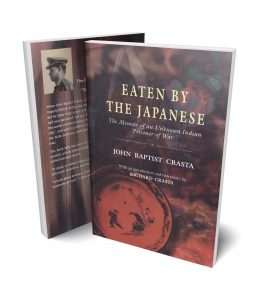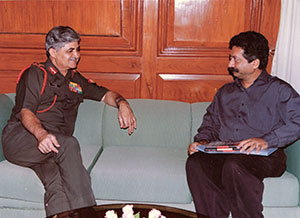
He attended Mangalore’s Saint Aloysius College High School, from which he was once kicked out for being too poor to pay his school fees.
He worked in Karachi for a few years, after which he joined the British Indian Army, where he was posted in Karachi and Quetta, and finally shipped to Singapore, a short while before the Japanese began their blitzkrieg.
He was captured along with thousands of Indian and British soldiers and sent to the island of Rabaul off New Guinea to work as a prisoner-laborer, amidst tortures and bombings. He was freed in late 1945, and returned to his home town, Kinnigoli, a wreck and barely alive. In 1946, while recuperating and gaining back his strength, he wrote his memoir of his experiences with the Japanese.
Can there be a more Invisible Man than John Baptist Crasta? He wrote his memoirs in 1946, at the age of 36, and for more than fifty years, his unread manuscript lay in a rusting steel trunk, while he went around India as a junior Army officer in places like Kashmir, Bangalore, Bombay, and Calcutta, and settled into invisible retirement in Mangalore, living a basic existence and riding a rusty bicycle for most of that time.
In 1947 he married Christine, and through her had four children: three boys and a girl. The second of those children, named Richard Crasta, went on to become a writer himself and ultimately, in his first act as a real publisher, to publish his father’s book through the aptly named Invisible Man Press.
He died in October 1999, having survived numerous tortures and near-escapes from death and reached the age of 89, and after having seen his first and only book published at the age of 87, in its first edition, from Invisible Man Books, India—making him probably the oldest first time Indian author until that time. A second edition was published in February 2000, through the Invisible Man Press, New York, and one more by a Singapore publisher shortly after that.

Richard Crasta with General Malik, Army Chief.
Whether or not that was one of his dreams, he did achieve one other dream which he might have considered totally unimaginable when he was growing up: he visited America in 1986, and also made a short trip to Canada while there. Unfortunately, the four-month break in his routine meant that when he returned to India, at age 76, he stopped using his bicycle.
John Baptist Crasta, a humble soldier, would never have dreamed that shortly after his death, the Chief of Staff of the Indian Army, General Malik, would read his book, be moved, and would ask to meet his son and his wife.
I’m delighted to hear from my readers or anyone with an interest in my writings. You can drop me an email by filling in the form below.
I will reply as soon as possible.